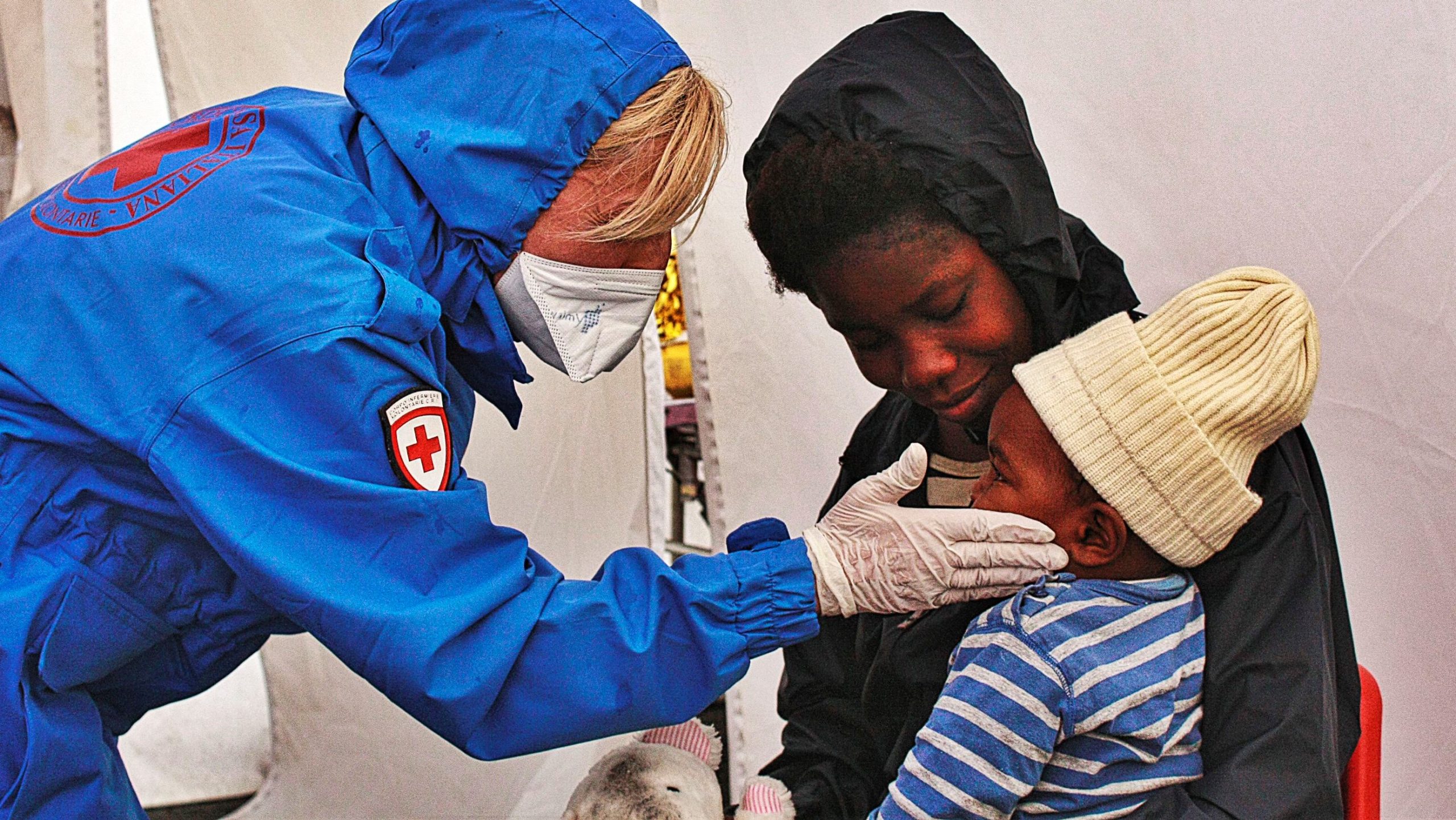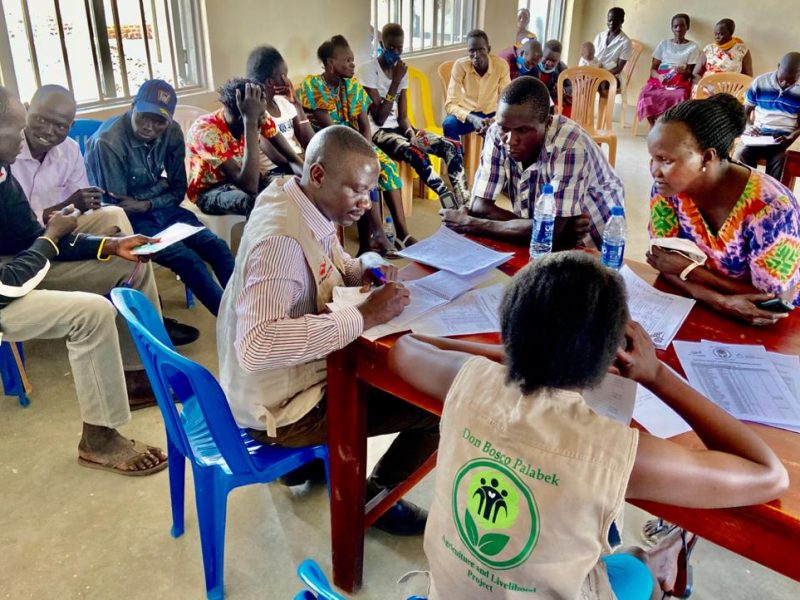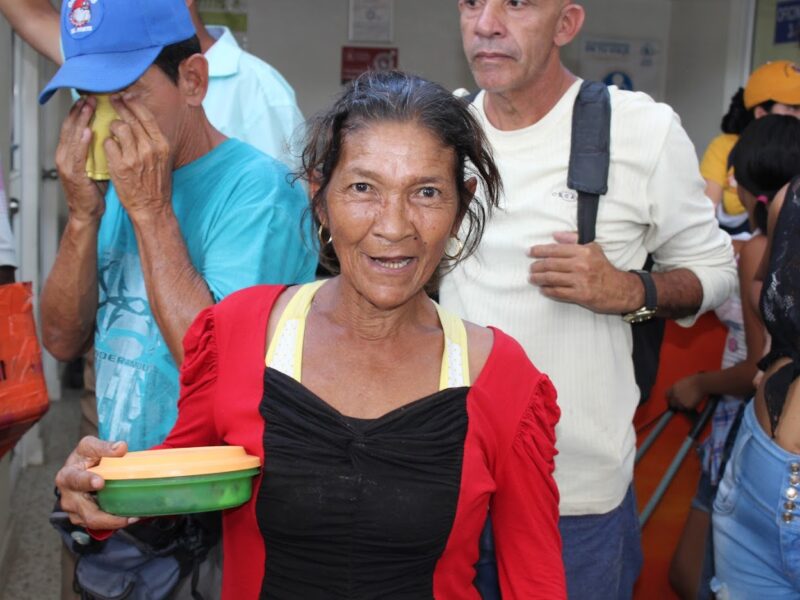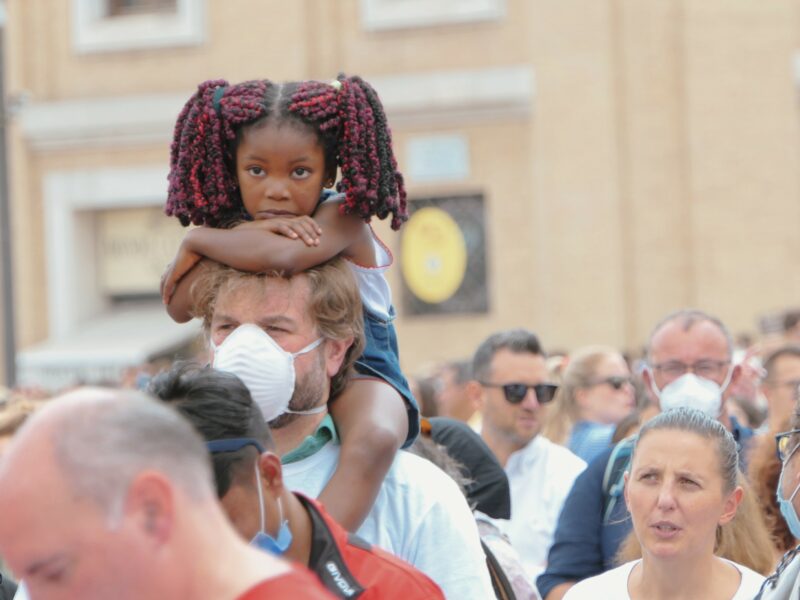
“From COVID-19 towards the future together”: Access to the Vaccine for Everyone

“May we work together to advance towards a new horizon of love and peace, of fraternity and solidarity, of mutual support and acceptance.” Pope Francis
M&R BULLETIN #2 | March 2021
Access to the Vaccine for Everyone
Nine out of 10 people in dozens of poor nations could miss out on getting vaccinated against COVID-19 this year, according to the People’s Vaccine Alliance, a coalition that includes Oxfam, Amnesty International, and Global Justice Now.
Since 85% of the world’s refugees and internally displaced people are situated in countries where national governments often struggle to meet the health needs of their own populations, these extremely vulnerable groups are at serious risk of being excluded from receiving vaccines. It is imperative to prevent inequalities within nations and to ensure fair access to COVID-19 vaccines by all, especially by the most vulnerable, regardless of their legal status.
The M&R Section believes that refugees, migrants, IDPs, victims of trafficking, and climate-displaced persons, should be vaccinated against the coronavirus in the same way as the rest of the population, and their particular vulnerability should be taken into account in determining priority access to vaccines. This bulletin focuses on the Catholic Church’s efforts to ensure that all humanity has access to COVID-19 vaccines, with special regard to all vulnerable people.
COVID-19 Vaccines: the Vatican position
Pope Francis has repeatedly appealed for COVID-19 vaccines to be available to everyone. Justice, solidarity, and inclusiveness are the main criteria to be followed in order to meet the challenges posed by this worldwide emergency. During his Christmas Day Urbi et Orbi address, he called on the nations of the world to share the new coronavirus vaccines with the most needy: “I ask everyone — government leaders, businesses, international organizations — to foster cooperation and not competition, and to seek a solution for everyone: vaccines for all, especially for the most vulnerable and needy of all regions of the planet.” During his General Audience of 19 August 2020, the Holy Father also presciently affirmed: “It would be sad if, for the vaccine for COVID-19, priority were to be given to the richest! It would be sad if this vaccine were to become the property of this nation or another, rather than universal and for all.”
In the statement “Vaccine for all. 20 points for a fairer and healthier world”, released by the Vatican COVID-19 Commission (VCC-19) in collaboration with the Pontifical Academy for Life, the various stages of the vaccination process are examined, from production to approval, from administration to distribution.
On the question of production, it is noted that, as an invention produced by human ingenuity, the vaccine is one more item on the market. However, “investments in the medical field should find their deepest meaning in human solidarity.” Therefore, the logic of “vaccine nationalism” should be overcome, in favour of international agreements that facilitate universal access to the vaccine, without discrimination, according to the principle of the universal destination of goods.
Regarding the criteria for administering and for access to the vaccine, VCC-19 endorses WHO’s proposal to “vaccinate … some people in all countries, rather than all people in some countries,” so as to avoid an outcome whereby “some countries receive the vaccine late due to prior large-scale purchase by richer states.”
Finally, VCC-19 identifies some guidelines intended to “obtain a safe and effective vaccine for COVID-19 so that treatment is available to all, with a particular concern for the most vulnerable, respecting equity across the full spectrum of the vaccine development/deployment.” Among these guidelines, we highlight in particular the Church’s commitment worldwide “to speak, exhort and contribute to assuring that quality vaccines and treatments are available to the global family, especially the vulnerable.”
Archbishop Ivan Jurkovič, the Holy See’s Permanent Observer to the United Nations in Geneva, has stressed the need for intensified international cooperation and multilateral efforts to fully respect fundamental human rights and to guarantee accessibility to COVID-19 vaccines for all. “Access for all to affordable medicines, tools, vaccines, diagnostics, and treatment is paramount for a recovery from the crisis: no one should be left behind”, said Abp. Jurkovič in an address to the World Intellectual Property Organization’s 32nd Standing Committee on Patents.
The Congregation for the Doctrine of the Faith (CDF) said similarly that it is “a moral imperative” for the pharmaceutical industry, governments, and international organizations to ensure that effective and ethically acceptable vaccines are accessible “to the poorest countries in a manner that is not costly for them.” The CDF concludes: “The lack of access to vaccines, otherwise, would become another sign of discrimination and injustice that condemns poor countries to continue living in health, economic and social poverty.”
Catholic actors advocate for equal access to vaccines
A mere 13% of the world’s population has already secured half of the available COVID-19 vaccines, and experts say that achieving universal vaccination could take years unless wealthy nations are willing to invest more in widespread distribution. Accordingly, the Catholic aid organisation Misereor calls on the European Union to provide fair and rapid access to vaccines against the coronavirus. Pirmin Spiegel, the Director General of Misereor, warns that “the world will only be able to deal with the COVID-19 crisis if we fight it everywhere, not just at home.” Indeed, if we defeat the virus only in individual regions, it will have time to mutate and could become even harder to fight. “Let’s make sure that all people who want it can be vaccinated quickly,” the Misereor leader urged.
In line with Pope Francis’s call for COVID-19 vaccines to be made available to the neediest, the Vatican has begun free vaccinations against the coronavirus for Rome’s homeless. “A first group of around 25 homeless people permanently housed in the care and residence facilities of the Office of Papal Charities received the first dose of the vaccine against COVID-19. Further groups are to follow in the coming days”, stated the director of the Holy See Press Office, Matteo Bruni. The initiative was overseen by Cardinal Konrad Krajewski, the head of the papal charities office.
The Red Jesuita con Migrantes (RJM) for Latin America and the Caribbean, together with a hundred social, academic, and human rights organizations, has issued a statement (ES) urging the governments of the region “to guarantee migrants, asylum-seekers, refugees and stateless persons access to all health services”, and in particular the coronavirus vaccine. They ask for the vaccination of vulnerable populations “without any discrimination and on an equal footing with the rest of the population.” The RJM warned that “the exclusion of migrants and refugees from plans to prevent and combat the pandemic” would jeopardize the public-health goals of recipient countries.
Denying undocumented workers a place in line for vaccination would be a moral and public health disaster, according to a number of Catholic ethicists. Their declaration was in response to the statement by the Government of Nebraska (USA) that undocumented workers would not be included in its vaccination program. Brian Kane, senior director of ethics for the Catholic Health Association of the United States, believes that undocumented workers should be at the head of the nation’s vaccination lines, as they are especially vulnerable because of their work and overall health conditions. Moreover, asking about immigration status in order to access vaccination might generate fear of deportation not just among undocumented workers, but also on the part of mixed-status families, and refugees or asylum seekers; this could result in excluding persons who are legally eligible. “From a Catholic perspective and I would say from a public-health perspective, there’s unanimity that we want to create the conditions for a healthy society, and that means not discriminating on the basis of immigration status,” affirmed Mr. Kane.
A vaccine for all humanity — no one must be left behind!
Cardinal Peter Turkson, Prefect of the Dicastery for Promoting Integral Human Development, spoke to Vatican News about challenges in providing access to COVID-19 vaccines and about the importance of facilitating vaccine production in developing countries. He raised particular concerns about intellectual property linked to medicines: while some African countries may have the capacity to produce COVID-19 vaccines themselves, they are unable to do so due to patents. This frustrates facilitating the universal access constantly invoked by Pope Francis. At the same time, we cannot exclude the use of traditional remedies, insofar as their effectiveness is demonstrated.
“The debate on vaccination has to be holistic, people-oriented and based on multilateralism and on the political will to promote access,” believes the Secretary General of Caritas Internationalis, Aloysius John, citing the interconnectedness of all humanity. He also encourages what he calls a “people vaccine” logic, which promotes global solidarity instead of national interest. The alternative, leaving poorer countries without access to vaccines, “will have dire and long-lasting consequences for human health.” Moreover, it will also cause significant economic damage, for both advanced economies and low-income countries. In short, “this global emergency can be addressed only if an affordable and effective COVID-19 vaccine is made available to all corners of the world.” The Secretary General’s closing thoughts are for migrants and refugees, who are always at risk of being forgotten. “These people in displacement or on the move are highly vulnerable to the pandemic and may not fall in the radar of the vaccination process.”
Father Charles Chilufya is the Coordinator of the Africa Task Force of the Vatican COVID-19 Commission and the Director of the Justice and Ecology Office of the Jesuit Conference of Africa and Madagascar. In an interview with Vatican News, he explains some of the challenges around the arrival of COVID-19 vaccines in Africa. The major issue, besides patents, is supply: “Rich countries are already out-buying poorer countries.” International cooperation, Fr. Chilufya notes, is also a factor. He reminds us that medical care is not a privilege for some, but it is a right for everyone, and he calls for international agreements to overcome bureaucratic obstacles and to ensure equal access to coronavirus vaccines. He also points out that “individual national interests and the power of some states over others” disrupt an equal distribution of the vaccine. However, such a self-interested attitude is not effective, explains Fr. Chilufya: “if the disease is not dealt with in Africa, it will affect other countries. This is not just a local problem, as we all know. It’s a public health problem of global proportions.” For this reason, he calls on all stakeholders to envision “a more cooperative global health system in the future.”
The Vatican COVID-19 Commission (VCC-19) organized an online meeting, entitled “Caring for persons, peoples and the planet in times of pandemic”, with the members of the Diplomatic Corps accredited to the Holy See. Father Carlo Casalone, moral theologian and member of the Pontifical Academy for Life, underlined that everyone must have access to the vaccine, in line with what has already been stated by VCC-19. The principles of “justice, solidarity and inclusion,” said Father Casalone, “must be the basis of any intervention in response to the pandemic.” The theologian also raised concerns about ethically unacceptable commercial exploitation of vaccines which is far from the values of human solidarity. For this reason, it is essential to overcome the logic of “vaccination nationalism” and to “support international agreements to manage patents in order to facilitate universal access to the vaccine.” During the webinar, VCC-19 renewed its commitment to promoting global cooperation within the Church, a commitment that involves all Catholic agencies, starting from the ground up. Sister Carol Keehan, CEO of the Catholic Health Association of the United States and coordinator of the Health Task Force within VCC-19, spoke of “resources” to be made available to local ecclesiastical structures and organizations around the world. These include clinical information on vaccines against COVID-19; a guide to ethical issues concerning vaccines; statements of Pope Francis’ teachings on a number of issues; and a guide for families.
Download Bulletin
For earlier issues of this Bulletin, please visit: migrants-refugees.va/en/c-19-bulletin
If you would like this Bulletin sent directly to your e-mail address, please send a brief request to media@migrants-refugees.org




